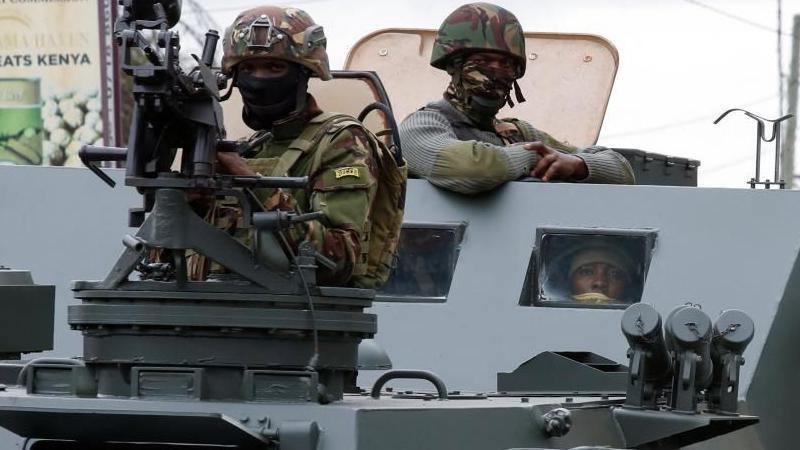Kenyan court allows military deployment to quell protests

Thursday's protests were smaller and less violent than earlier in the week
- Published
Kenya's High Court has approved the use of military force to restore order, following days of anti-tax protests that at some point overwhelmed police.
More than 20 people have reportedly been killed in the nationwide protests that are largely led by young people opposed to government plans to increase taxes.
Armoured military vehicles patrolled streets in the capital, Nairobi, on Thursday as police fired tear gas to disperse protesters, who had threatened to storm the presidential palace.
A judge said that the military deployment was critical to protect government installations but gave the authorities two days to clarify how long the deployment would last, along with its rules of engagement.
"To deploy the military in a blanket manner without defining their scope of operation and the duration of their operation is a dangerous trend that can bring about militarisation of the country," ruled Justice Lawrence Mugambi.
The Law Society of Kenya, which had petitioned the court to order the army back to the barracks, said it "respects but disagrees" with the ruling.
President William Ruto on Wednesday bowed to pressure and said he would withdraw the finance bill containing the unpopular tax proposals, a day after parliament was briefly stormed and set ablaze by angry protesters.
Isaac Mwaura, the government spokesman, told the BBC's Newsday programme that the withdrawal of the bill was a "huge blow to the government as it left a "big hole" in the budget.
"It is really a big setback," Mr Mwaura said, blaming "misinformed" Kenyans for opposing it.
"There was a very well choreographed campaign, both locally and internationally, to misinform and disinform people so that they can create a revolt," he added.
The finance bill was aimed at raising taxes to help relieve the country's debt burdens, as demanded by lenders including the International Monetary Fund.
Many protesters doubt if the president will implement the austerity measures he announced on Wednesday.
They have also been angered by reports of arbitrary abductions of protesters and the killing of at least 23 people, according to a doctors' association. Some are now calling on the president to step down.
State agents have been accused of abducting hundreds of people linked to the protests.
Many of those who have been released have no physical injuries but have been left so traumatised that they do not want to speak about the experience, says Faith Odhiambo, president of the Law Society of Kenya (LSK).
"Most of them were thrown on the roadside and left really shaken. One of them left for the village where he said he felt safer near his mother," Ms Odhiambo told a local radio station.
The state-funded Kenya National Human Rights Commission said it had helped secure the release of more than 300 people who had been "illegally detained".
Deputy President Rigathi Gachagua has expressed his regret that the criminal justice system had been used to manage the politics of the country.
Chief Justice Martha Koome has also condemned the abductions, saying they amounted to a direct assault on the rule of law.
But Mr Mwaura denied this, saying "criminal elements who wanted a coup d'etat" had tried to take advantage of the peaceful protests.
More Kenya stories from the BBC:

Go to BBCAfrica.com, external for more news from the African continent.
Follow us on Twitter @BBCAfrica, external, on Facebook at BBC Africa, external or on Instagram at bbcafrica, external